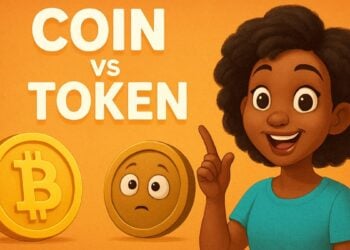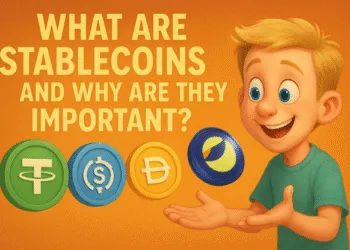Bitcoin is the original cryptocurrency that sparked a global financial revolution. Since its mysterious creation in 2009, Bitcoin has grown from an experiment in digital money to a trillion-dollar asset that’s reshaping how we think about finance, ownership, and freedom.
But what exactly is Bitcoin? How does it work, and why do people believe it could change the future of money?
In this beginner-friendly guide, we’ll break it all down — from Bitcoin’s origins and technology to how it’s used today. Whether you’re curious about buying Bitcoin, investing in crypto, or just want to understand what the buzz is about, this guide will give you the solid foundation you need.
New to crypto altogether? Start from the beginning with our guide: What Is a Cryptocurrency? A Beginner’s Introduction
The Birth of Bitcoin
Bitcoin was born out of a financial crisis. In 2008, while banks were collapsing and public trust in the traditional financial system was at an all-time low, a mysterious figure — or group — using the name Satoshi Nakamoto released a whitepaper titled “Bitcoin: A Peer-to-Peer Electronic Cash System.”
The idea was simple but radical: create a type of money that doesn’t require banks, governments, or middlemen to function. One year later, in January 2009, the first block of the Bitcoin blockchain — known as the Genesis Block — was mined, marking the launch of the world’s first decentralized digital currency.
Fun fact:
The Genesis Block included a hidden message — a newspaper headline from the day — referencing the bailout of banks. The exact message read:
“The Times 03/Jan/2009 Chancellor on brink of second bailout for banks”
This was a subtle but powerful critique of traditional finance. The quote, taken from the front page of The Times (UK), was widely interpreted as a statement of intent: Bitcoin was born as an alternative to a failing and manipulated system.
Bitcoin’s vision was bold: to give people complete control over their money and remove the need to trust third parties. No one owns Bitcoin. There’s no CEO. It runs on code, powered by a global network of users.
How Does Bitcoin Work?
At its core, Bitcoin is a peer-to-peer digital currency that allows people to send and receive value without relying on a bank, government, or any centralized authority. Instead, it runs on a technology called the blockchain — a public, tamper-proof ledger that records every transaction ever made.
Each time someone sends Bitcoin, that transaction is verified by thousands of independent computers across the world. These computers, known as nodes, work together to ensure that no one can cheat the system, double-spend coins, or alter the transaction history.
But what really makes Bitcoin work is its consensus mechanism called Proof of Work. Here’s how it works in simple terms:
-
-
- New transactions are bundled into “blocks”
- Miners (specialized computers) compete to solve a complex puzzle
- The first to solve it validates the block and adds it to the chain
- That miner is rewarded with new bitcoins — this is called mining
-
This process happens roughly every 10 minutes and continues until the total supply of 21 million bitcoins is fully mined — making Bitcoin a scarce digital asset, similar to gold.
The Role of Wallets and Keys
To use Bitcoin, you need a wallet. This can be a mobile app, desktop program, hardware device, or even a piece of paper. Your wallet holds two important keys:
-
-
- Public Key: like your Bitcoin address (you can share it)
- Private Key: your password to access your funds (keep it secret)
-
Lose your private key? Unfortunately, there’s no password reset. This is why storing your crypto securely is critical.
Want to dive deeper into how wallets work? Read: How to Set Up a Crypto Wallet (Step-by-Step)
Why Is Bitcoin Valuable?
Bitcoin doesn’t have a physical form, isn’t backed by gold or a government, and doesn’t generate cash flow like a company. So… why does it have value?
The answer lies in a mix of scarcity, trust, and utility — and how those elements come together in a way that’s never been seen before in the history of money.
-
-
- Limited Supply = Digital Scarcity
-
Only 21 million bitcoins will ever exist. This limit is hard-coded into the protocol and cannot be changed. Unlike fiat currencies — which central banks can print endlessly — Bitcoin is mathematically scarce.
This makes it similar to gold, which is why Bitcoin is often called “digital gold.”
-
-
- Decentralization & Trustless Security
-
Bitcoin doesn’t require trust in any single person or institution. It’s run by code, and verified by thousands of independent nodes worldwide. Every transaction is transparent, timestamped, and stored forever on the blockchain.
This decentralization makes it resistant to censorship, fraud, or manipulation — unlike traditional financial systems.
-
-
- Global Utility
-
Bitcoin can be sent anywhere in the world in minutes, with no need for a bank. For people living in countries with high inflation, currency controls, or unstable governments, Bitcoin becomes more than just an investment — it becomes a lifeline.
In countries like Venezuela, Turkey, or Nigeria, Bitcoin adoption has surged as local currencies lose value.
What Can You Do with Bitcoin?
Bitcoin started as an experiment in peer-to-peer payments — but over time, it has evolved into a multi-purpose asset with global use cases. Whether you’re looking to invest, transact, or build with it, here’s what Bitcoin can actually be used for today:
-
-
- Long-Term Investment (HODLing)
-
Many people buy and hold Bitcoin as a long-term store of value, betting that its scarcity and adoption will drive future growth. In this context, Bitcoin acts like digital gold — a hedge against inflation and fiat currency debasement.
Large institutions and public companies now hold Bitcoin as part of their treasury strategies.
-
-
- Trading & Speculation
-
Thanks to its volatility, Bitcoin is actively traded on platforms worldwide. Traders profit from short-term price movements, using technical analysis or algorithms. While risky, it attracts both professionals and newcomers.
-
-
- Global Payments
-
Bitcoin can be sent across borders quickly and securely, without intermediaries. It’s especially valuable in countries with capital controls, unstable currencies, or limited access to banking.
-
-
- Financial Freedom in Unstable Economies
-
For millions, Bitcoin is not just an investment — it’s a tool for survival. In places like Argentina or Lebanon, where banks restrict withdrawals, people turn to Bitcoin to preserve their wealth and regain financial control.
Bitcoin doesn’t ask for ID, a credit score, or permission — anyone with an internet connection can use it.
-
-
- Spending & Donations
-
While not yet mainstream, an increasing number of merchants accept Bitcoin for real-world purchases — from tech products to flights. It’s also widely used for donations, especially during times of crisis.
Bitcoin FAQs
Is Bitcoin still worth buying in 2025?
Bitcoin remains the most established and widely held cryptocurrency. While the market is volatile, many consider BTC a long-term store of value with strong fundamentals.
Can I turn Bitcoin into cash?
Yes — you can sell Bitcoin for cash through crypto exchanges, ATMs, or peer-to-peer platforms. Some wallets also offer direct withdrawal to bank accounts.
Is Bitcoin a good investment?
That depends on your risk tolerance. Bitcoin has outperformed most traditional assets over the last decade, but its price can fluctuate wildly. Many view it as a long-term hedge against inflation.
How do I get money from Bitcoin?
You can convert Bitcoin into fiat currency by selling it on an exchange. Alternatively, you can spend it directly with merchants or use crypto debit cards.
How many people own 1 Bitcoin?
As of early 2025, only a small percentage of wallets — fewer than 1 million — hold 1 BTC or more. This highlights Bitcoin’s scarcity and increasing demand.
Is using Bitcoin safe?
The Bitcoin network is extremely secure. However, the safety of your funds depends on how well you protect your private keys and wallet access.
Final Thoughts: Why Bitcoin Still Matters
Bitcoin challenges how we think about money, who controls it, and who gets to use it. Whether you’re interested in investing, building, or simply understanding what’s shaping the future, learning about Bitcoin is a powerful first step.
It’s not too late. In fact, you’re early.
Keep Learning









